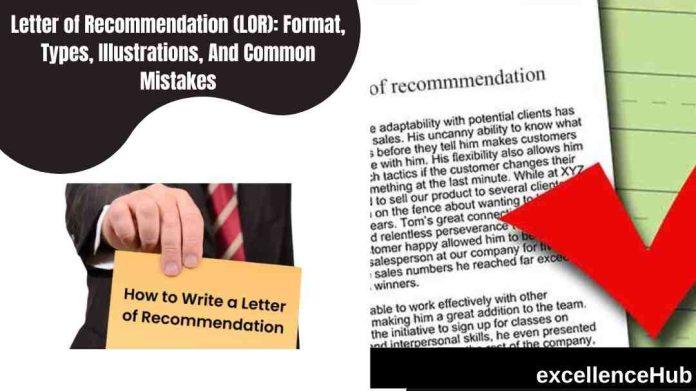A letter of recommendation (LOR) is a document that endorses someone’s professional or academic performance. The letter examines your personality, including attributes, talents, limitations, and team/class engagement.
Reference letters are typically written by former professors, employers, clients, teachers, or counsellors. In academia, LOR is frequently required for postgraduate programs. LORs play a significant part in programs such as MBA, MS, and Computer Science.
LOR Types
Students are asked to submit an academic or professional letter of recommendation based on their accomplishments and current activities. Graduate courses in business, engineering, medicine, education, and other disciplines sometimes require both academic and professional letters of recommendation.
Academic LOR vs Professional LOR
| CRITERIA | ACADEMIC LOR | PROFESSIONAL LOR |
|---|---|---|
| Writers | Professors/ Teachers/Counsellors | Supervisors/Managers/Clients |
| Required for | Bachelors, Masters, and Research | Mandatory courses like MBA, MEng, Medicine, Education, etc |
| No. of Letters Required | 2 to 3 | 1 to 2 |
| Skill-Sets to Focus On | Academic performance and the ability to grasp difficult concepts. | Professional behavior, team-work, and leadership qualities, etc. |
Letter of Recommendation Layout
A recommendation letter outlines the applicant’s qualifications, skills, strengths, and flaws. A common letter of recommendation structure has three sections and five paragraphs:
- Introduction (one paragraph)
- Information on applicant’s skills and qualities (Three paragraphs)
- Conclusion (one paragraph)
Content of LOR
Basic information on what to include in an LOR and how to submit it to universities abroad are:
- Recommend relationship with the student
- Duration and nature of the relationship
- Details about student and student performance (that is, potential research topics, student’s potential, professionalism, interpersonal and leadership skills, passion for the field, personal characteristics, and other specialty-specific information)
- Proof of Relevant Work Experience
- Past and current accomplishments
- Analytical skills and critical thinking
- Academic and extracurricular opportunities and activities
- Zeal, enthusiasm, motivation, and devotion to the intended program.
- Uncertified or certified skills applicable to the program applied for.
- Factors that may influence the applicant’s performance.
- Information on how applicants fare vs contemporaries.
Letter of Recommendation for Top Programmes
Although the basic standards for professional and academic letters of recommendation for students are same, the prerequisites and prompts differ by course. The qualifications and structure for certain top courses are listed below.
| PROGRAM | NO. OF LORS | TYPES OF LORS | THEME |
|---|---|---|---|
| LOR for MS | 3 | At least 2 Academic LORs | Emphasize on academic achievements, capabilities, interests, and career goals |
| LOR for MBA | 2-3 | At least 1 Professional LOR | Highlight problem-solving skills, leadership qualities, strengths, and areas of improvement |
| LOR for PhD | 2-3 | Academic LORs | Talk about knowledge of subject, prior research & publications, and academic performance |
| LOR for UG | 1-2 | Academic LOR | Academic achievements and relationships with peers should be highlighted |
Letter of Recommendation (LOR) Samples
To
The Administrative Head
Universiti Malaya
Kuala Lumpur, Malaysia
Respected Sir/Madam,
I am glad to propose Mr Zainal Abidin for admission to the MBA program at Universiti Malaya, batch 2024. I’ve known Mr Sharma for five years as a business undergraduate at Universiti Sains Malaysia’s School of Business. I have over 20 years of teaching experience and have been the Dean of the School of Business at Universiti Sains Malaysia in Penang for the past five years.
Zainal Abidin joined our institute after placing #97 out of 2000 competitors in the Penang Diploma examinations. He is an excellent student who has never finished lower than fifth place during his undergraduate studies. He is a sincere student, well-liked by both his teachers and peers, with a real desire to learn. Zainal Abidin’s interest in entrepreneurship was evident from his first year at the institute, when he joined the Entrepreneurship Club at USM. As a member of this group, he has competed in and won various competitions by developing economical and functional electrical solutions for home use.
Furthermore, Rohit was really enthusiastic in research. He delivered a research paper titled “Role of Social Social Business in Changing the World” at the International Conference on Social Business in Kedah in 2021. He did a thorough investigation, critically analyzed reports, and presented the paper. Zainal Abidin’s sincerity impressed the academics, and his research work was published in the International Journal of Advanced Research.
Mr Zainal Abidin will substantially benefit from attending your excellent business school since he wants to be an entrepreneur and offer low-cost, effective solutions for home needs. Mr Zainal Abidin is not only an exceptional academic performer, but he is also an excellent team player with natural leadership ability. He has outstanding communication skills and effortlessly captures the attention of any room he enters. Mr Zainal Abidin found it difficult to manage his academic and extracurricular activities when he first began his bachelor’s degree. However, throughout the years, he has also developed outstanding time management abilities.
I am convinced that Mr Zainal Abidin will be an invaluable contribution to your institute, achieving great things while also aiding his peers. He will greatly benefit from the international business exposure that this programme provides. I wish him all the best for the future.
I would be happy to share additional information about the candidate if necessary. On any working day, I am available by email or phone at my office.
Thank You
Yours Sincerely,
Dr Bahyah Binti Rahman
(Dean, School of Business in Universiti Sains Malaysia ) Penang, Delhi
LOR Writing Tips
Obtaining a letter of recommendation from your employer or professor may not appear to be a difficult endeavour, as these individuals have known you for a reasonable amount of time. However, it is critical to ensure that the letter of recommendation format they supply is remarkable and meets its objective.
Some of the tips to get an impressive letter of recommendation for a student is:
- Check the university’s guidelines: Sometimes institutions urge the recommender to follow a specified format, both in terms of submissions and content. For example, a letter of recommendation for Ireland must be presented simultaneously with the application form, whereas letters of recommendation for the United States are typically submitted separately by recommenders.
- The tone and concept of the LOR should remain consistent. Recommenders must avoid using conflicting tones while drafting letters of recommendation. Furthermore, it should address the applicant’s strengths and limitations.
- Begin with a good introduction: It is best practice for recommenders to begin the letter with a few paragraphs about themselves, the professional capacity in which they are now employed, and the years of experience they possess. Furthermore, the introduction should develop rapport between the candidate and the recommender.
Concentrate on the journey, not just the milestones: Recommenders frequently make the error of praising their candidates without providing real-world examples. The best practice is to objectively write forth the applicant’s skills and strengths, along with pertinent examples. For example, if you believe your applicant possesses strong leadership abilities, explain a real-life situation in which he or she volunteered to take on responsibilities and displayed leadership qualities.
Also Check: University of Pittsburgh Boren Scholarship
Common Mistakes to Avoid While Writing LOR
There are quite a few common mistakes that both recommenders and the students asking for a recommendation must avoid. Following are some tips to submit a great LOR by avoiding those common mistakes:
- Using dishonest means: It’s tempting to buy a letter of recommendation, especially online. However, it would be wise to avoid falling into these traps. Universities employ highly advanced plagiarism detection tools and expert admissions counsellors.
- Approaching the wrong recommender: Remember to only seek references from persons who have recently dealt with you in a professional or academic setting. Ideally, you should seek references from teachers who have led you in some research or practical capacity, as well as prior workplace superiors.
- Check: How Do I Choose the Right Recommender?
- Not allowing your recommender enough time: Recommenders are frequently busy professionals with tight schedules; consequently, you should always approach them 3-4 weeks in advance. Furthermore, you should follow up with your recommenders on the status of your LOR to ensure they have not forgotten about the critical responsibility you have assigned to them.
Not providing your recommender with correct guidelines: Don’t forget that your professor interacts with hundreds of students every day. And your old manager oversees tens of staff. Make an attempt to make your recommender’s life easier by keeping them up to date on your most recent successes.
- Exaggerating your abilities and achievements: Your letter of recommendation (LOR) from a professor or employer should include both your skills and weaknesses. Frequently, recommenders focus solely on the applicant’s qualities, failing to emphasize areas for growth. However, universities value constructive criticism, and providing it only serves to strengthen the recommendation’s authenticity and sincerity.
- It is impossible to overstate the significance of a letter of recommendation (LOR), as it says considerably more about an applicant than their class rank, grades, and test results. The material contained in the letter is typically used by the admissions committee to get more insight into the applicant’s technical proficiency, practical knowledge, social skills, and professional qualities—aspects that are just not transferable from an academic record. Letter of Recommendation (LOR).


